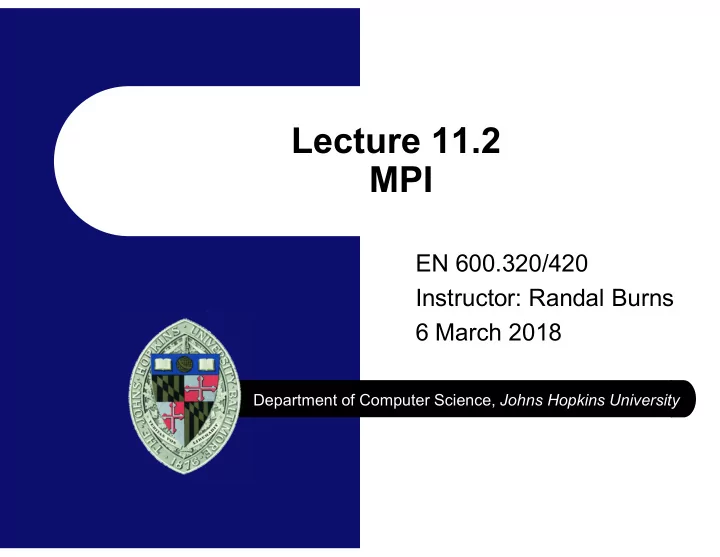

Lecture 11.2 MPI EN 600.320/420 Instructor: Randal Burns 6 March 2018 Department of Computer Science, Johns Hopkins University
MPI MPI = Message Passing Interface – Message passing parallelism – Cluster computing (no shared memory) – Process (not thread oriented) Parallelism model – SPMD: by definition – Also implement: master/worker, loop parallelism MPI environment – Application programming interface – Implemented in libraries – Multi-language support (C/C++ and Fortran) Lecture 4: MPI
Vision Supercomputing Poster 1996 Lecture 4: MPI
SPMD (Again) Single program multiple data – From wikipedia “ Tasks are split up and run simultaneously on multiple processors with different input in order to obtain results faster. SPMD is the most common style of parallel programming. ” – Asynchronous execution of the same program (unlike SIMD) https://www.sharcnet.ca/help/index.php/Getting_Started_with_MPI Lecture 4: MPI
A Simple MPI Program Configure the MPI environment Discover yourself Take some differentiated activity See mpimsg.c Idioms – SPMD: all processes run the same program – MPI_Rank: tell yourself apart from other and customize the local processes behaviours Find neighbors, select data region, etc. Lecture 4: MPI
Build and Launch Scripts Scripts wrap local compiler and link to MPI mpirun to launch MPI job on the local machine/cluster – Launch through scheduler on HPC clusters (do not run on the login node) Lecture 4: MPI
HPC Schedulers Maui/Torque https://www.osc.edu/supercomputing/getting- started/hpc-basics SLURM OGE Each with their own submission scripts – Not mpirun Lecture 4: MPI
Managing the runtime environment Initialize the environment – MPI_Init ( &argc, &argv ) Acquire information for process – MPI_Comm_size ( MPI_COMM_WORLD, &num_procs ) – MPI_Comm_rank ( MPI_COMM_WORLD, &ID ) – To differentiate process behavior in SMPD And cleanup – MPI_Finalize() Some MPI instances leave orphan processes around – MPI_Abort() – Don ’ t rely on this Lecture 4: MPI
MPI is just messaging And synchronization constructs, which are built on messaging And library calls for discovery and configuration Computation is done in C/C++/Fortran SPMD program I’ve heard MPI called the “ assembly language ” of supercomputing – Simple primitives – Build your own communication protocols, application topologies, parallel execution – The opposite end of the design space from MR, Spark Lecture 4: MPI
Recommend
More recommend